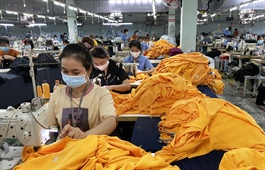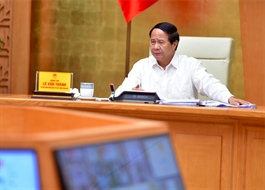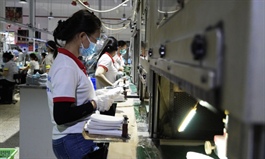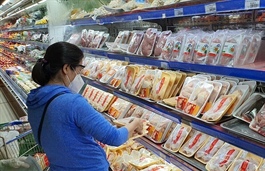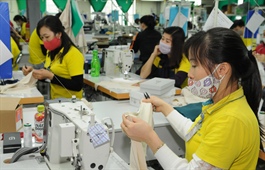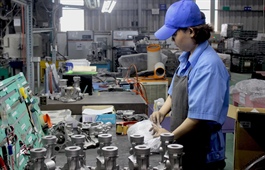Viet Nam’s automobile supporting industry remains underdeveloped
Viet Nam’s automobile supporting industry remains underdeveloped
Only a few spare parts are produced domestically, forcing domestic manufacturing and assembling enterprises to import automobile spare parts from other sources, experts said.

Experts said after nearly 30 years, Viet Nam’s supporting industry can produce 287 spare parts while about 30,000 parts are needed to make a car. Vietnamese part-supply companies can produce simple items including windshield tape, energy consumption labels, registration stamps, fuel pipes, water tank covers, tyres, tubes, electric wires, seats, bumpers, batteries, wheels, exhaust pipes, and air conditioners.
Only a few businesses have invested in producing car bodies. These do not include engine parts such as gearboxes, safety and electronic systems.
According to the Vietnam Automobile Manufacturers Association (VAMA), a single car has about 30,000 parts, with 80 per cent of components imported and 20 per cent domestically produced. As a result, the price of locally-manufactured and assembled autos is 20 per cent higher that that of imported ones.
Car sales in Viet Nam are expected to reach one million units a year by 2025, opening up substantial opportunities for businesses to develop a supporting industry for the sector.
Experts, however, have said that the production capacity of the existing supporting industry remains poor, especially in terms of capital, technology, and experience. Production and the business environment also lack breakthrough policies.
According to the Ministry of Trade and Industry, Viet Nam is now home to more than 350 enterprises in the automobile supporting industry around the country, of which some 80 percent are foreign-invested. Most of the domestic players are of small scale and have difficulties accessing capital to invest in technology, while links between them remain poor.
Industry insiders said that the number of Vietnamese spare part suppliers in the auto industry is very small. Thailand has nearly 700 tier-1 part suppliers, while Viet Nam has less than 100. In addition, Thailand has about 1,700 suppliers of Tier 2 and 3 and Viet Nam has less than 150.
Experts attributed the poor supporting industry to the small scale of the local automobile market. The Vietnamese auto market is one-third the size of Thailand and a quarter compared to Indonesia. The local auto market is home to many car assemblers of different models. This has resulted in difficulties for domestic car assemblers and part suppliers to invest in purchasing new production lines to meet various demands.
Le Duong Quang, chairman of the Vietnam Association for Supporting Industries (VASI), said over the past 30 years, a series of policies for the local auto industry and supporting industry had been enacted. However, feasibility and effectiveness of the implementation remained poor.
Breakthrough policies needed
The three largest car makers in Viet Nam, including Thaco, Hyundai Thanh Cong and Vinfast, have taken the initiative in investing in part suppliers to enhance the localisation ratio and export volume of spare parts and vehicles.
Thaco was successful in exporting cars while other local car makers considered shifting to import and export of auto spare parts. A series of Thaco's spare parts and products have been also exported to Korea, Japan, Malaysia, Italy, Russia, Cambodia, Turkey, and Kazakhstan.
Thanh Cong Group has also invested in building the Thanh Cong Viet Hung automotive supporting industry complex. It covers 340 ha at the Viet Hung Industrial Park in Ha Long city and is expected to attract more businesses in the automotive supporting industry.
The VinFast automobile manufacture factory of Vingroup will also set aside 70ha of its land for potential supporting industry to put up their own plants as VinFast targets using 60 per cent local parts in its cars and 100 per cent for electric motorbikes.
The Ministry of Industry and Trade also said that the market size and different prices between domestically-produced and imported cars as well as the difference in production costs against regional countries were the two biggest bottlenecks of Viet Nam’s automobile industry.
VASI Chairman Quang affirmed that supporting industry companies acknowledged that it was essential to revive or conduct breakthrough policies. In addition, State-run agencies should work with businesses helping them to overcome difficulties. The Government needed to create more incentives for automotive businesses.
Car expert Nguyen Minh Dong said to promote the supporting industry, the Ministry of Science and Technology should conduct specific criteria for automotive part suppliers that meet international standards.










